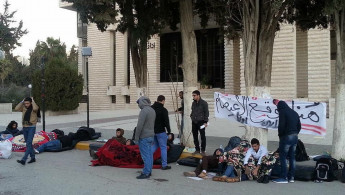Jordanian students in two-week campus 'sleep-in' protesting tuition hikes
The sit-in has triggered a heated debate in the kingdom. Though it has garnered a lot of support among Jordanians, there has been criticism of the students' actions.
Pictures and videos of students marching on campus and sleeping outside UJ halls have spread on social media sites.
The sit-in has become the most trending topic in the country, displacing the nation's preoccupation with the nomination of a Jordanian film to the Oscars last week.
The students want the university to reverse a decision taken some three years ago to raise tuition fees by 30 to 210 percent in the parallel, post-graduate and international programmes.
The more expensive parallel programme is open to both Jordanians and non-Jordanians who were excluded from admission through competetion.
The students have been protesting the decision since June 2014, but say that after exhausting all options, they now decided to go on an open-ended strike until their demands are met.
|
But students say the hikes affect their ability to pursue post-graduate studies.
The government-owned university should be supported by the state to ensure equal opportunity to all Jordanians, especially in light of the dire state of the economy, Majd al-Saliti wrote in 7iber last week.
The sit-in routine
The sit-in starts every day at 3 pm outside the rectorship building and the main library, and lasts until 8 am the following day.
The number of people spending the night on campus is steadily increasing.
The students are concerned the university administration could order campus security to break up the sit-in.
However, UJ President Ekhleif Tarawneh told local press that no measures will be taken against the protesters as long as they are protesting "peacefully".
Twitter Post
|
On Monday, negotiations between the students and UJ administration failed to reach an end to the sit-in, but students and university officials agreed to form a committee to find solutions.
Political motives?
According to local press, the protest brought students from
different parties together, including leftist and Islamist students.
While some students believe this is a sign of healthy diversity, there have been accusations that some political parties are promoting their ideologies through the demonstrations, both on social media and from UJ officials.
Meanwhile, some students even accused the Jordanian government of deliberately engineering the hikes to push poorer students into military service, which they claimed have a manpower shortage.
|
Regardless of the sometimes intense debate on social media, the majority of Jordanians, including intellectuals and journalists, have voiced support for the sit-in, emphasising the need for affordable education in a country hit by high unemployment and poverty rates, made worse by more than one million Syrian refugees fleeing the war next door.
For now, the sit-in is set to continue, and given the level of support it has, it could even expand outside the university campus if the university does not compromise.
|


